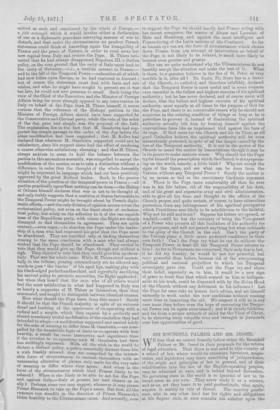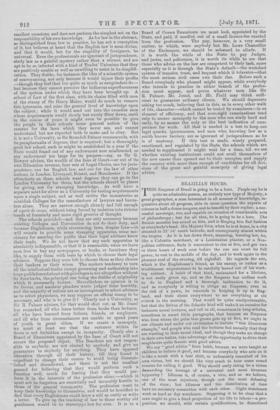SIR ROUNDELL PALMER AND MR. TESSEL.
WE fear that we cannot heartily follow either Sir RoundelY Palmer or Mr. 3 essel in their proposals for the reform of legal education. That there is real need in this country of a school of law, where would-be attorneys, barristers, magis- trates, and legislators may learn something of jurisprudence, of the origin and principles of law in general, and of their
solidification into the law of the English-speaking peoples, may be admitted at once, and is indeed beyond discussion.
No governing class in the world is so ignorant of law in its broad sense as our own, They never study it as a science, i and as an art they leave t to paid professionals, who, again, acquire it mainly by rule of thumb. The country gentle- man, who in any other land has his rights and obligations at his fingers' ends, in ours consults his solicitor upon the
smallest occasions, and dare not perform the simplest act on the responsibility of his own knowledge. As for law in the abstract, as distinguished from law in practice, he has not a conception of it, but believes at heart that the English law is semi-divine, and that it would, but for the stupidity of foreigners, be universal. Even the professionals are ignorant of jurisprudence, study law as a gainful mystery rather than a science, and are apt to be so infected with a kind of Trades' Unionism that they are positively unable as well as unwilling to assist in its simplifi- cation. They dislike, for instance, the idea of a scientific system of conveyancing, not only because it would injure their profits
—though they feel that too quite as much as sawgrinders do—
but because they cannot perceive the ludicrous superfluousness of the system under which they have been brought up. A school of Law of the first class, with its chairs filled with men of the stamp of Sir Henry Maine, would do much to remove this ignorance, and raise the general level of knowledge upon the subject ; while it would send out into the counties men whose acquirements would slowly but surely filter down, until in the course of years it might even be possible to give the people in their schools some general notion of the reasons for the laws which they never see, and cannot understand, but are expected both to make and to obey. But it is not a University, as Sir Roundell Palmer recommends, with its paraphernalia of degrees, that is required; but a thoroughly good law school, such as might be established in a year if the State would found out of any endowment now misdirected, or any endowment too large for its purpose—say, as Sir G. Bowyer advises, the wealth of the Inns of Court—or out of its own Education revenue, four sets of Legal Chairs, one for juris- prudence, one for English law, and one for the law of other nations, in London, Liverpool, Bristol, and Manchester. If the
attendants on these schools want degrees they can go to the London University for them, but the schools should be places for giving, not for stamping knowledge. As well have a separate mint for silver as a University for testing acquirements upon a single subject, and as well relive the monasteries as establish Colleges for the manufacture of lawyers and barris- ters alone. They are narrow enough already and full enough of esprit de corps, without being forced by isolation into stricter bonds of fraternity and more rigid grooves of thought.
The schools provided—and they are only necessary because existing Colleges and Universities do not do their duty, and because Englishmen, while reverencing laws, despise Law—it will remain to provide some stamping apparatus, some ma- chinery for assuring the public that their legal advisers know their trade. We do not know that any such apparatus is absolutely indispensable, or that it is reasonable, when we leave men free to buy any newspapers, or books, or furniture they like, to supply them with tests by which to choose their legal advisers. Suppose they were left to choose them as they choose their bankers or their wives. The modern tendency to turn all the intellectual trades except governing and authorship into huge guilds fenced about with privileges is not altogether without its drawbacks, the principal one being the dislike of originality which it necessarily fosters. Nevertheless, as opinion is in its favour, and amateur pleaders waste judges' time horribly, and the majority of suitors are as incompetent to select advisers as to select physicians, we may suppose an official stamp to be necessary, and who is to give it ? Clearly not a University, as Sir R. Palmer advises, for that would shut out, as Mr. Teasel has remarked, all who learn better from books than lectures, all who have learned from fathers, friends, or employers, and all who from circumstances are unable to spend years
of youth in great cities. If we create a monopoly, we must at least see that the entrance within its doors is not forbidden except to incapacity. Clearly also a Board of Examiners appointed by the Inns of Court will not secure the proposed object. The Benchers are not respon- sible to anybody, are not elected by anybody, and give no guarantees to anybody for anything. They have opposed education through all their history, till they found it expedient to change their course to avoid being disestab- lished and disendowed, and there is not the smallest ground for believing that they would perform such a function well, much for fearing that they would. per- form it in the interests of the profession alone,—whieh it must not be forgotten are essentially and incurably hostile to those of the general community. The profession want to keep their knowledge to themselves, and would be horrified to find that every Englishman could draw a will as easily as write a letter. To give up the teaching of law to those worthy old gentlemen would be to stereotype law for ever. It is to a
Board of Crown Examiners we must look, appointed by the State, and paid, if needful, out of a small licence-fee exacted from the profession. The pay, however, is a very small matter, to which, were anybody but Mr. Lowe Chancellor of the Exchequer, we should be ashamed to allude. If it is worth the while of the State to pay Judges, and juries, and policemen, it is worth its while to see that those who advise on the law are competent to their task, more especially as it is through the State's default—the wretched system of transfer, trust, and bequest which it tolerates—that the most serious civil cases owe their rise. Before such a Board everybody who pleased might appear, while everybody who intends to practise in either branch of the profes- sion must appear, and prove whatever men like Sir R. Palmer, Mr. Jessel, and Mr. Field may think suffi- cient to guarantee ordinary clients. We should deprecate asking too much, believing that in this, as in every other walk of life, character—which cannot be tested by examiners—is an element of efficiency, and that over-rigid examinations tend only to secure monopoly to the men who can study hard and early, by no means the only or the best indication of com- petence for work. All that is needed is a test to keep out legal quacks, ignoramuses, and men who, knowing law as a smith knows farriery, are as ignorant of jurisprudence as he is of anatomy. If this test is made, wisely prepared, sanctioned, and regulated by the State, the schools which are needed to supplement it might wait for a time, till we see whether existing institutions could not avail themselves of the new career thus opened out to their energies, and supply the country with more than enough of candidates for all divi- sions of the great and gainful monopoly of giving legal advice.

































 Previous page
Previous page